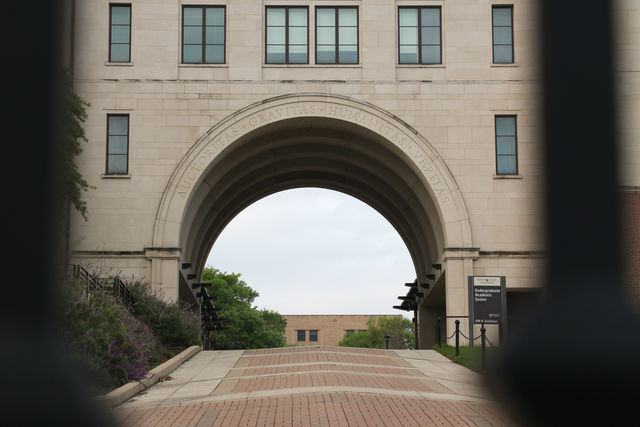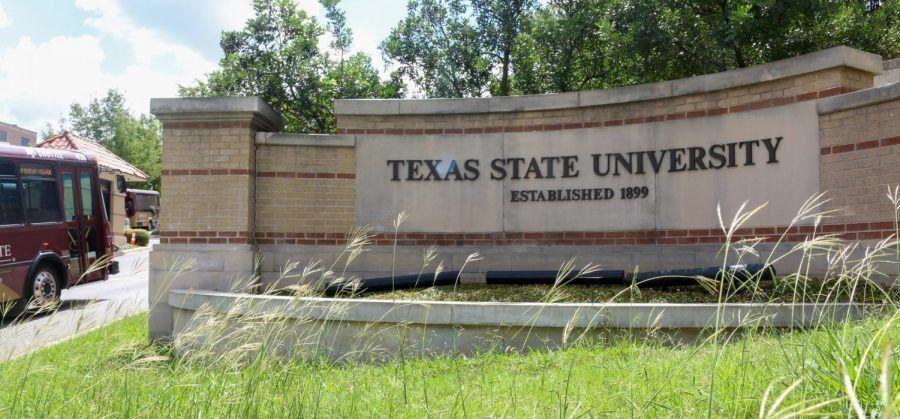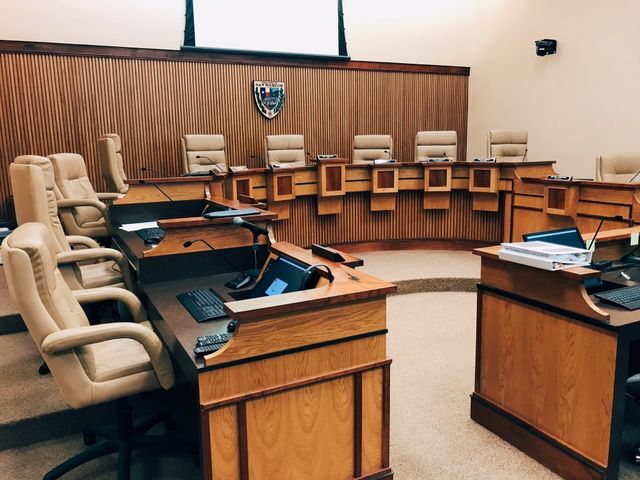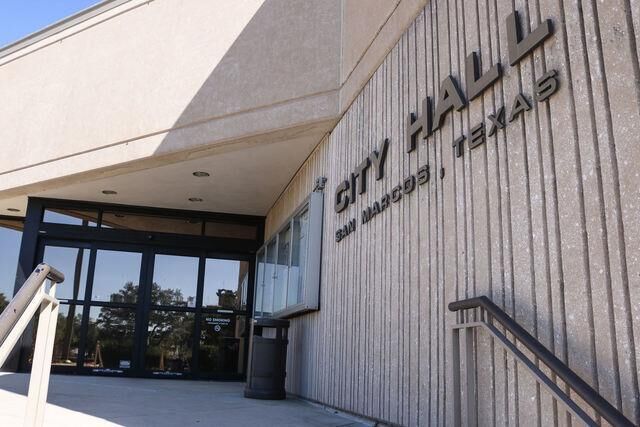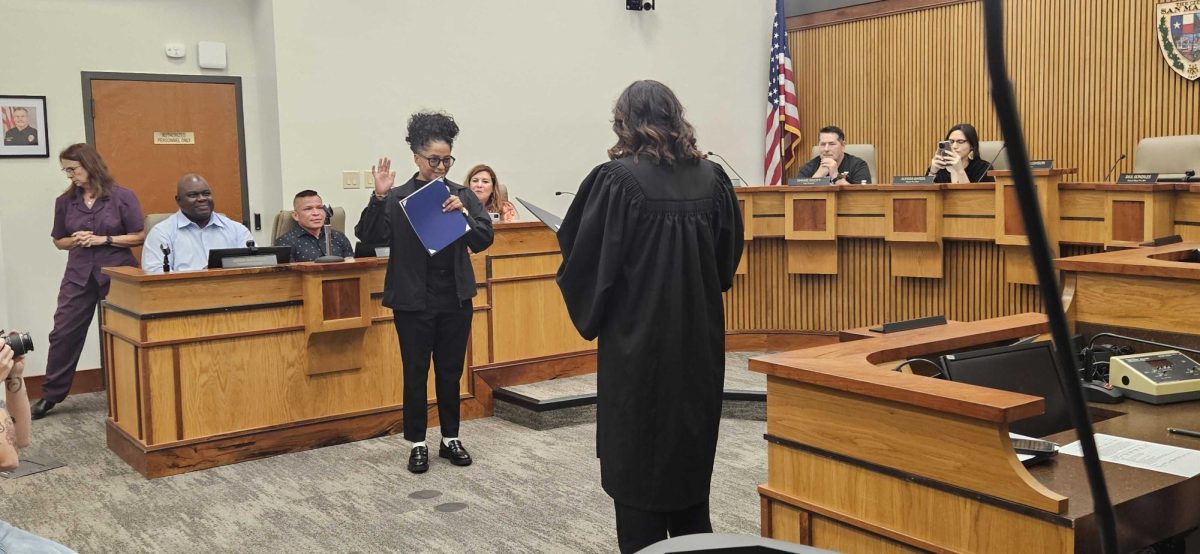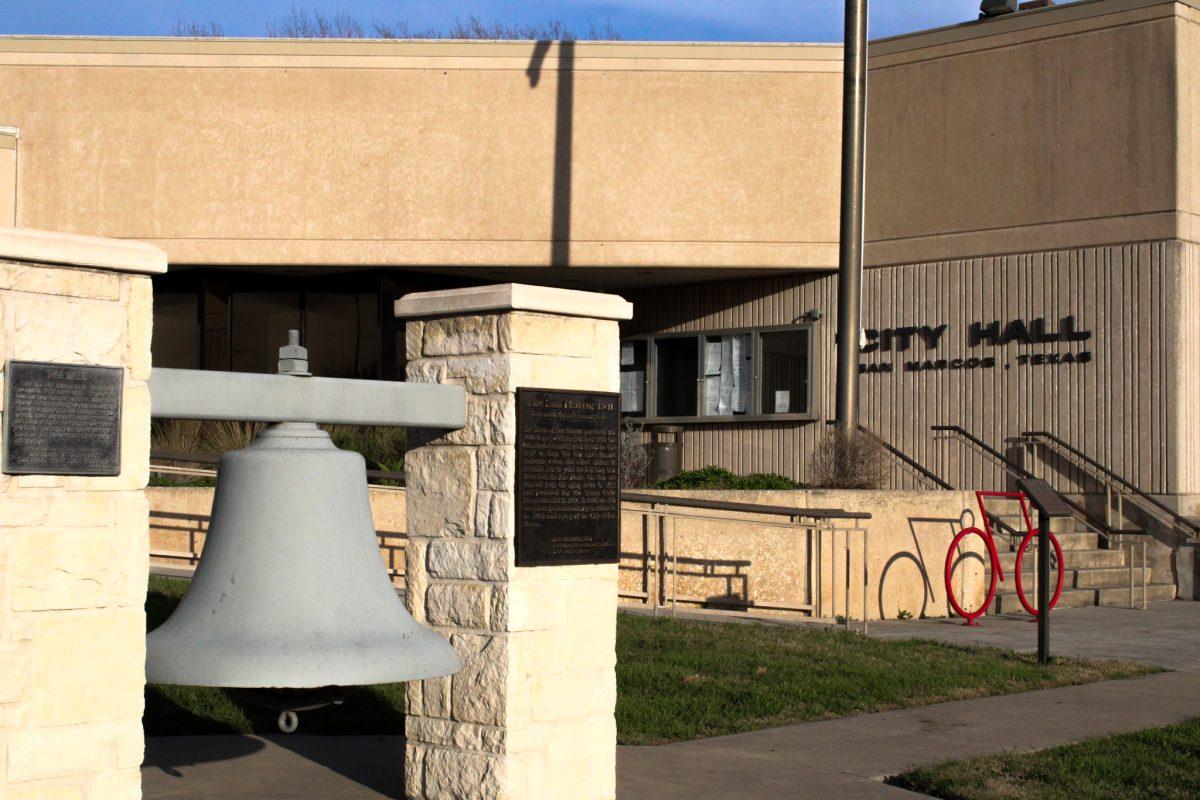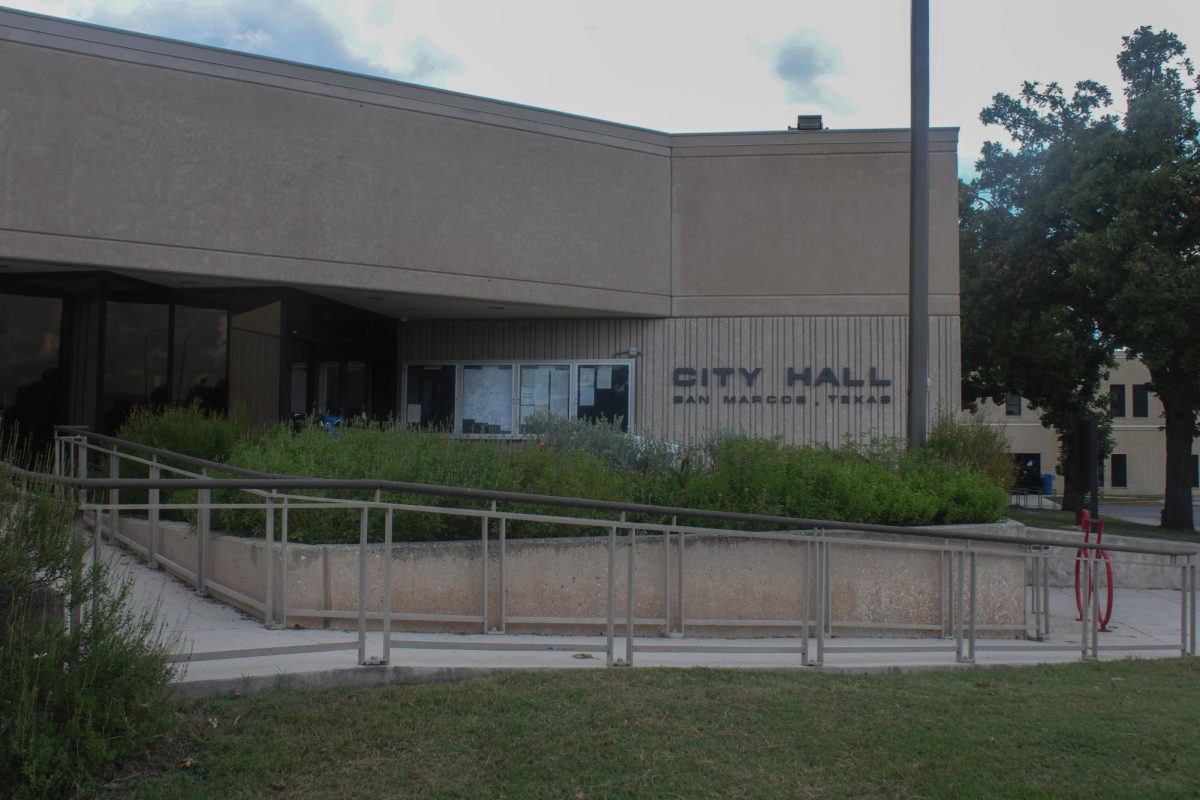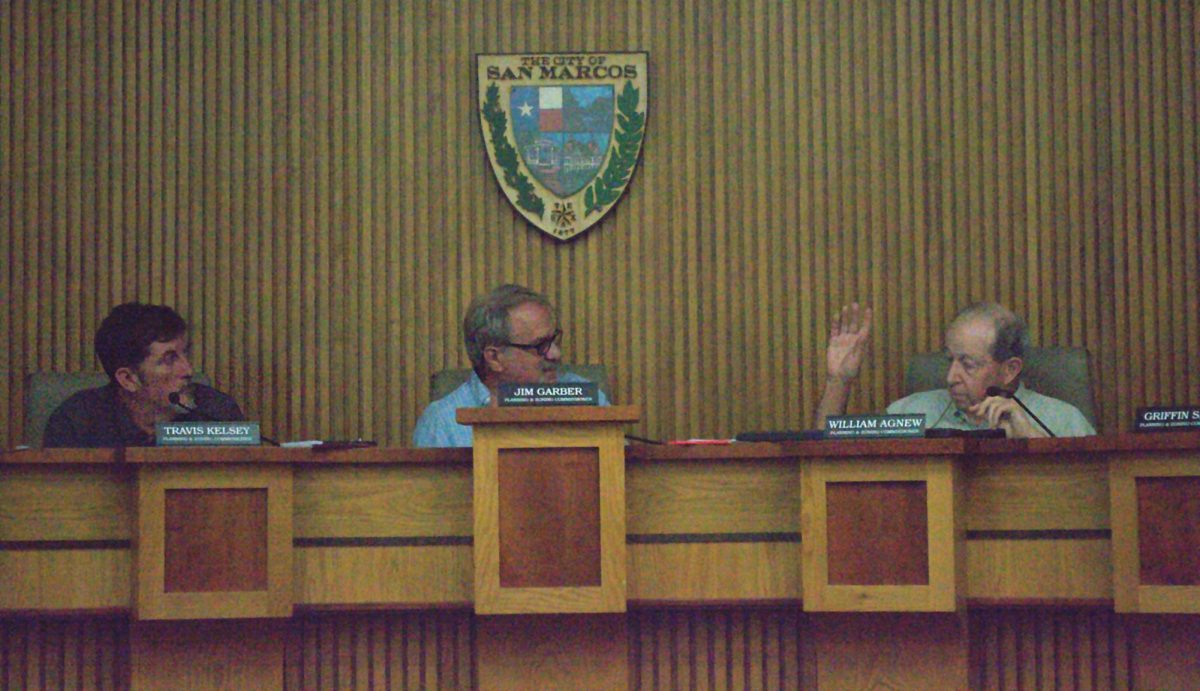Questions are being raised around a development company proposing a high-rise student apartment complex called the McLain Project, which is set to be built across the street from Texas State’s campus.
At the first reading of the proposal on April 2, city council voted 6-1 on the first of the proposed amendments after the initial vote failed to secure a supermajority, which is required after the San Marcos Planning and Zoning Committee recommended denial on Feb. 27.
City council also voted to table the remaining amendments and the McLain Project is set to go before the San Marcos City Council for its second and final vote on April 16.
“It all comes back to students need to be where students are at,” Councilmember Matthew Mendoza said at the April 2 meeting. “Students deserve options. It’s important that we listen to them and provide them access to where they need to be. I never feel right about denying anyone a place to live, and at the end of the day, that’s what this is.”
Due to confusion over the amendments and a lack of a written list of the concessions the developer has agreed to, city council sent the developer and his consulting team with city staff to draw up a clearer plan during the city council meeting.
“It makes sense for this to be a student housing area – it is literally across the street from the university,” San Marcos Mayor Jane Hughson said at the April 2 meeting. “The west side of Lindsey is going into single family structures. I’m having a really hard time calling this [downtown zoning] because I don’t think west of Lindsey [Street] is downtown, and I don’t really want to extend downtown to it.”
However, there seem to be data discrepancies from the developer, as well as ongoing legal questions.
Amendments and zoning
The apartment site is at the intersection of North Street and Lindsey Street and is the current location of the Lindsey Oaks apartments, The Elms apartments and multiple residential homes.
Since the proposed project was brought back before the city in August 2023, numerous San Marcos residents and students have spoken at city meetings to criticize the project, including resident Camille Phillips and Tenants Advocacy Group (TAG) Civil Engagement Advocate Mikayla Rodi.
“Many of us have voiced our concerns,” Phillips said. “San Marcos is basically a little town still. Our downtown is constrained [by] the river on one side, university on the other side [and] the railroad on the third side. Why extend past North Street to the area of town that’s always been residential with small buildings?”
The amendments city council will consider include:
- PSA-23-02: Preferred Scenario Amendment to change area from “Existing Neighborhood” to “High-Intensity Downtown.” According to the San Marcos Land Development Code, an existing neighborhood is classified as an “established, primarily residential [area] intended to maintain their existing character.” Changing the area to “High-Intensity Downtown,” would designate it as “an area of change intended to accommodate the city’s future growth and expansion where people can meet their daily needs within a short walk, bike, transit trip or drive.”
- CUP-23-22: Request for a Conditional Use Permit to allow a purpose-built student housing and a reduction in the parking ratio to 0.75. Purpose-built student housing is defined as “one or more buildings, each containing two or more living units, that are designed, marketed or used for the primary purpose of housing college students.”
- ZC-23-19: Zoning request to change the current zoning from “Multi-family MF-12, MF-18 and MF-24” to “Character District-5 Downtown.” Changing the zoning to “Character District-5 Downtown,” would “provide for mixed use, pedestrian-oriented development in downtown [and] to promote walkability and to encourage street level retail activity.”
- AC-23-09: Building height request to increase the permitted building height from five to seven stories.
Rodi and Phillips are both concerned the project will contribute to the influx of rent-by-the-bed housing in San Marcos, which they believe will further disrupt neighborhoods and the San Marcos community.
“TAG is concerned because if [the developers] extend downtown, that kind of sets a precedent. So if they wanted to extend downtown later, they very much could,” Rodi said. “The extending of downtown that increases high intensity increases apartments [and] student housing, and it pushes out the single-family homes and multi-family homes. We don’t want to push out traditional housing, and extending downtown would kind of do that.”
Project details and timeline
Matthew Kenyon, the main developer and managing partner at Kenyon Companies, began the McLain Project in August 2023 after submitting new documents and applications for the proposal to the city of San Marcos .
However, a previous version of the project, CUP-21-15, began in 2020 with a pre-development meeting between San Marcos city staff, Kenyon and Stephen Schneider, the sole employee of Kenyon Companies on official city documents.
The original proposal, CUP-21-15, only included the properties at 410 and 420 North St. – both shown in city documents as owned by Matthew Kenyon through his limited liability companies (LLC) and property ownership records.
Shannon Mattingly, director of land use and entitlements at the Drenner Group, a real estate law firm that specializes in land use, and former director of planning and development services for San Marcos, is also a part of the currently proposed version of the project as a consultant through the Drenner Group.
Although Mattingly has only been involved in an official capacity through the Drenner Group for the newly proposed version of the project, she was on city staff as director of planning and development until September 2022 and was involved in the original proceedings.
On June 8, 2021, the San Marcos Planning and Zoning Committee met and recommended denial of the project. The McLain Project was supposed to be discussed on the agenda at the city council meeting on July 6, 2021, but it was not put on the final agenda and the project was withdrawn until August 2023.
On city documents from the first application in 2021 as well as the second in 2023, Kenyon supplied documents that showed he works for Kenyon Companies.
To operate as an LLC in the state of Texas, the business must have an active registration with the Secretary of State. Additionally, if the company is based out of state and wants to conduct business in Texas, the company must still register with the Texas Secretary of State’s office using a registered agent based in Texas.
If a company is conducting business in a state without being registered in that state, the company could face legal consequences.
In the database of businesses registered with the Texas Secretary of State’s office, there are two LLCs registered on Feb. 11, 2020, both under Kenyon’s name.
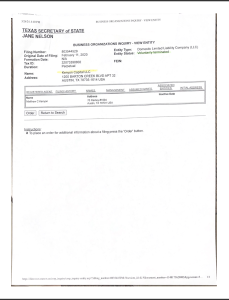
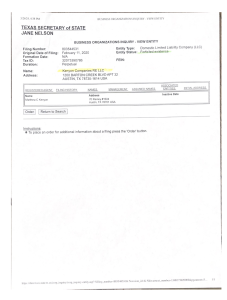
Kenyon Capital, LLC was voluntarily terminated on Aug. 11, 2022 and is no longer legally in use. Kenyon Companies RE, LLC forfeited its existence on June 24, 2022 and is also no longer legally in use.
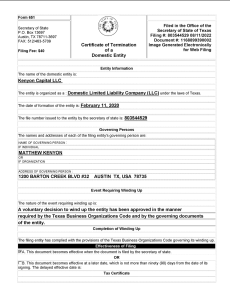
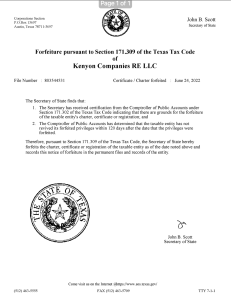
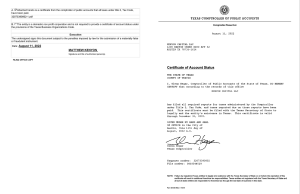
Both companies are registered with Kenyon using the same addresses, but there is no current legally registered version of Kenyon Companies, LLC, that is owned by Kenyon in the state of Texas.
Kenyon said he registered Kenyon Companies, LLC in Delaware as it has the most protection for developers.
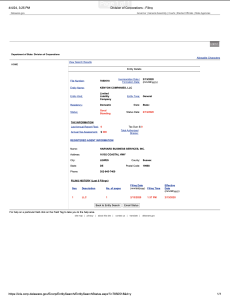
However, the Kenyon Companies, LLC registered in Delaware is not registered with the Secretary of State’s office in Texas and has no known registered agent based in Texas.
According to Delaware’s Division of Corporations, Kenyon Companies, LLC is in good standing, but it has not filed taxes since its creation in 2020 and has no documented income.
Additionally, the website for Kenyon Companies is an unregistered domain, and the address Kenyon supplied on city documents for Kenyon Companies, LLC is the same address as a brewery in Austin that was created in 2019.
“We have way too many jobs and not enough time to do them all, so I just have not kept up with the website,” Kenyon said. “I need to get back on it, but we do almost all of our things through just word of mouth. We develop several thousand apartments, and we have so many relationships in town that we just don’t use our website, so we let it go.”
Kenyon has also used similar variations of the brewery’s address on other city documents, but none are known to be currently legally associated with him or Kenyon Companies.
Kenyon said he does have an association with the brewery through a personal friendship with the owner of the brewery and his initial investment in the brewery.
“I do have a percentage ownership in [the brewery],” Kenyon said. “I just use that [address] because I get my mail there, and I work over there a couple days a week.”
However, according to a representative from the brewery, Kenyon has no association outside of being an outside capital investor and having a non-controlling ownership percentage in the brewery.
For the McLain Project, this means Kenyon is not operating under a legally registered LLC in Texas and is misrepresenting the status of Kenyon Companies.
Kenyon also included on his LinkedIn and Facebook profiles that he is a Managing Partner and Owner at Core One Commercial since its founding in 2016 and still works there presently. However, the website for Core One Commercial is also an unregistered domain, and the only information publicly available for the company is on the Facebook page, which lists no official company contact information.
Additionally, the address provided in the official LinkedIn page for the company, 2705 Bee Caves Rd, Ste 300, is occupied by another business, Jacobs. There is no record of Core One Commercial ever operating out of the building or the address provided.
According to the database of registered businesses with the Texas Secretary of State’s office, Core One Commercial is not a registered business, and there is no record of it ever operating in Texas. There is also no record of Core One Commercial operating in Travis County as a sole proprietorship, according to the Travis County City Clerk’s database.
Additionally, Kenyon was appointed as managing director of the multi-family and student housing group at St. Croix Capital in 2018, and his social media still shows he is employed there. However, a representative from St. Croix Capital confirmed he worked there until 2020 but does not presently.
St. Croix Capital was also able to confirm Schneider worked there from 2016-20 and left around the same time as Kenyon, who then formed the now-inactive LLCs, Kenyon Capital, LLC and Kenyon Companies RE, LLC, in February 2020.
Kenyon currently owns the property at 420 North St. and 435 N. Comanche St. and has signed city documents, including the original conditional use permit from 2021, verifying his ownership with the title of “Managing Partner,” at Kenyon Companies.
The property at 410 North St. is legally registered to “Registered Agents, Inc.,” but Kenyon is not listed as an owner of that LLC in the Secretary of State’s database.
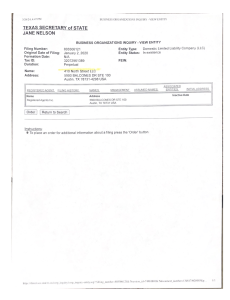
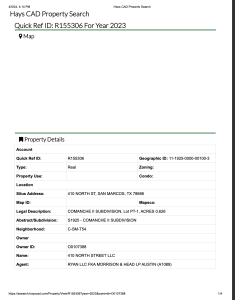

However, in city documents from 2021, Kenyon signed as the owner of “410 North Street LLC,” to verify his ownership of the property 410 North St. For the mailing address, Kenyon supplied the address of Executive Financial Consultants, which is located in Dublin, Ohio, and is not a known address associated with Registered Agents, Inc. or Kenyon.
San Marcos resident Peggy Taylor owns 421 Lindsey St., 413 North St., 415 North St. and 419 North St. while resident Daryl Burttshell owns 499 North St., all of which are properties involved in the proposed McLain Project. Both have agreed to let Mattingly represent them through the process of bringing the amendments before the city of San Marcos.
City documents and data discrepancies
Apart from concerns regarding Kenyon Companies, one point of dispute in the project is data the Drenner Group and Kenyon used to support the demand and validity of the project, including a study submitted and conducted on July 17, 2023 by Charles Heimsath, president of Capitol Market Research.
The study looked at parking utilization rates at 10 rent-by-the-bed student housing apartment complexes within about a mile of 420 North St., which is where the developers plan on building the McLain complex.
Capitol Market Research suggested a parking ratio of 0.70 parking spaces per bed leased at the property, but their data also provided information regarding occupancy rates at these apartments. The study determined 4,243 beds were leased out of the 4,301 total number of beds, which calculates to an occupancy rate of about 98.7% at these 10 properties.
In the packet Drenner Group and Kenyon presented to the San Marcos Planning and Zoning Committee on Feb. 27 and City Council on April 2, the developers cited a need for student housing due to the “independent study done by Capitol Market Research [which] found that the current occupancy rates are at 97% in student housing projects city-wide, and showing a current need for over 3,000 student beds.”
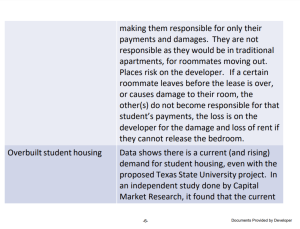
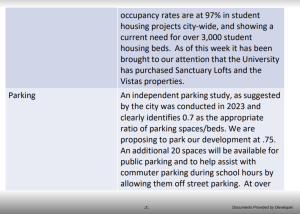
However, the Capitol Market Research study in July 2023 only looked at parking utilization within about a one-mile radius of 420 North St., not student housing occupancy rates in San Marcos city-wide.
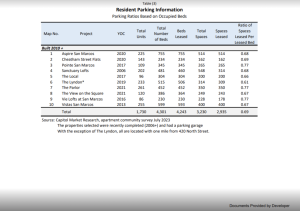
Additionally, the table Drenner Group and Kenyon provided is titled “Student Housing Occupancy Information (within a 10-mile radius).“ However, this table was originally titled, “Table 3: Resident Parking Information,” from the Capitol Market Research study, and the renamed version in the packet was cropped in half.
“To the best of my knowledge, we only looked at apartments within a one mile radius,” Kenyon said. “It sounds like that ’10 miles’ was probably just a typo, [the study] was about one mile.”
The document with the renamed title and cropped table includes the data Capitol Market Research collected from the original scope of the study of about one mile from 420 North St., but it was not data from a 10-mile radius as the renamed title shows.
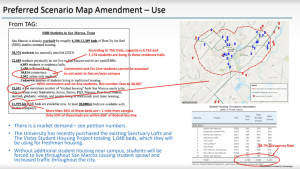
Kenyon said the Drenner Group put the packet together, but city documents cite the documents are provided by the developer, which would be Kenyon.
“I don’t think that we studied everything in the whole city, but we honestly have been asked to do constant studies from the city,” Kenyon said. “If there’s a typo in one of those thousands of pages, I wouldn’t be surprised. It certainly was not intentional.”
While the initial packet may have included a typo, the presentation of the data as a city-wide occupancy study from a 10-mile radius does not match the conclusion of the study that was conducted by Capitol Market Research.
Some San Marcos residents believe the city does not need more housing, due to studies on multi-family housing completed by the city and the amount of rent-by-the-bed apartment complexes throughout the city that still have availability.
“Those of us who care about the city have been disputing those allegations [of high occupancy rates] for several years,” Phillips said. “Apartment complexes say they’re 97% occupied or whatever, but if somebody calls them up and wants an apartment, there’s immediate occupancy available.”
The amendments regarding the McLain Project will be brought before San Marcos City Council again on April 16 and will serve as the final vote on the project.
“If there have been a few typos, all I can tell you is that they haven’t been intentional, [and] in no way did we try to deceive the public or the city,” Kenyon said. “That’s just not the type of company we are.”
This is a developing story and will be updated as more information becomes available.






